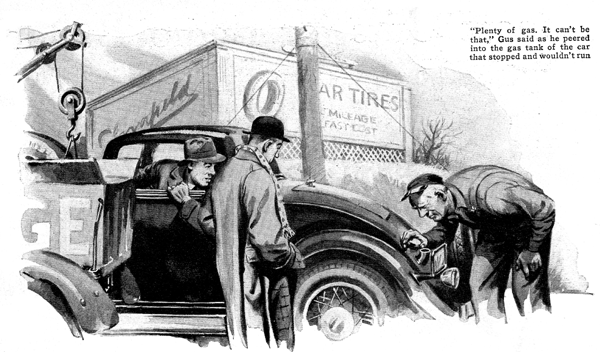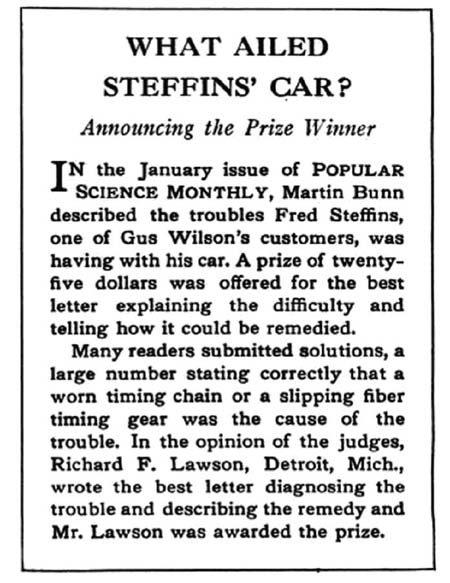January 1934
by Martin Bunn

Confound it, now what?" Fred Steffins grumbled as he pushed the gear lever into second. "First time I've ever had to shift on this hill."
John Crae, who was sharing the front seat with him, leaned forward to get his ear nearer the dashboard. "Motor sounds sweet enough," he observed. "Maybe you gave it too much gas."
"Nope, it wasn't that," Steffins informed him. "I've noticed it several times this morning. You'd feel it if you were driving. The motor's sluggish; won't take the gas and hasn't any power. Think I'll stop and have a look."
Ten minutes later he banged down the hood and faced his companion dejectedly. "It's got me," he confessed. "I've been over her from stem to stern and I can't find what's wrong. The wiring seems O. K. and so are the breaker points."
"Oh, it's probably a little water in the gas," said John carelessly. "What's the difference so long as it runs? Let's get going and it may clear itself up."
But things got worse instead of better. Every mile or so, something seemed to happen inside the motor that made it lose more and more power. Even gradual hills began to prove too much for high gear. Finally, as Fred shifted into low to coax the car over a slight grade just outside of town, the motor drew its final gasp and refused to start again.
"I knew it was coming," Fred wailed. "Now what are we going to do?"
"Call the Model Garage of course," said John. "You stay here and I'll find a phone."
A short time later, Gus Wilson, veteran mechanic and half owner of the Model Garage, arrived in his service car.
The two men related the peculiar happenings of the last hour.
"Now let me get this straight," Gus said when they had finished. "First of all, when you started out, everything seemed to be O. K. Then all of a sudden you noticed that the motor didn't have its usual pep. It got worse and worse until she wouldn't climb hills and finally stopped altogether. Is that right?"
Steffins nodded. "And the motor sounded all right," he added.
"Good. Then we can start from there." Gus walked to the rear of the car, unscrewed the gas tank cap, and peered down the hole. "Plenty of gas. It can't be that," he reported.
"And the gas line isn't clogged either," put in Crae. "We checked up on that." "Well, gas isn't our problem, then," agreed Gus. "Have you got the motor crank handy?"
"How about the ignition?" Steffins asked as he handed Gus the crank. "Do you want it on?"
Gus shook his head and began turning the motor over slowly by hand. "That's funny," he said finally. "The compression's not so good. Does the motor use much oil?"
"Don't put in a quart from one oil change to the next," said Steffins. "She's not a heavy oil pumper if that's what you mean. Take a look at the plugs. You'll see they're pretty clean."
"Well, something's cut down the compression. But then, I never knew a motor to go dead just because the compression was a little weak," said Gus.
Like a doctor examining a patient, the veteran mechanic went over the motor piece by piece. The ignition, wiring, distributor, carburetor, breaker points, condenser, and the spark plugs all proved to be in perfect order. To Steffins and Crae, finding what had caused the motor suddenly to lose power and stop seemed like an endless trail of tests.
"One more thing and we'll have the answer," announced Gus at last. "I want somebody to hold his foot on the starter button while I put my ear next to the carburetor."
Steffins lost no time climbing into the driver's seat. When Gus signaled, he stepped on the starter. As the motor spun, a hissing noise, like escaping air, came from the carburetor.
"There! Did you hear that?" cried Gus, turning to Crae.
Crae nodded and moved closer to the motor block. "Plain as day," he agreed. "You know, come to think of it, I heard that this morning but didn't pay any attention to it. What does it mean?"
"That's the deciding symptom," Gus chuckled triumphantly. "When a motor suddenly loses power and stops and the carburetor makes that hissing noise it can mean only one thing --"
What ailed Steffin's car? Put on your thinking cap and get in line for a prize. Popular Science Monthly is going to pay twenty-five dollars ($25) for the best letter from a reader describing the trouble and telling how to remedy it.
Was the fault in the battery? The valves? The pistons? Or was it something else? Get busy right away and mail your entry to Gus Wilson. Popular Science Monthly, 381 Fourth Avenue, New York, N.Y. before January 31, 1934, when the contest closes.
Of course, all employees of Popular Science Monthly and their families are excluded from this contest and in the case of a tie, each tying contestant will be awarded the full prize.
END
L. Osbone 2019
